To see four poems of astonishing depth, and my latest photo, go here.
If you want my new novel, The Eye That Never Sleeps, and can wait until the release date, May 2, pre-order it now from the publisher, Black Rose Writing, at a 15% discount from the retail price of $18.95; it will ship on May 2. The e-book will be available soon after May 2. The more sales I have online, the better. I will sign copies later on request. If you can't wait, buy a signed author's copy from me now at $20.00 + postage.

Did you ever have a friend who at times acted like your enemy, or an enemy who at times became your friend? The Eye That Never Sleeps tells the story of just such a friendship. The fourth title in my Metropolis series of historical novels set in nineteenth-century New York, it will be released on May 2.
Hired by the city’s bankers to track down and apprehend the thief who is plundering their banks, private detective Sheldon Minick develops a friendship with his chief suspect, Nicholas Hale, an elegant young man-about-town who is in every way the sober Methodist detective’s opposite. They agree to a truce and undertake each to show the other the city that he knows and values. Further adventures follow, including a cancan, a gore-splattered slaughterhouse, and a brothel with leap-frogging whores. But when the truce ends, the inevitable finale comes in the dark midnight vaults of a bank.
This is not a standard detective story. Sheldon Minick is a bit scared of women, wears elevator heels to add to his height, and loves to belt out Methodist hymns at church (though he leaves the praying to his wife). He is fascinated by Nicholas Hale, who is young, dapper, free-spending -- a risk-taker, deft with women, bisexual.
For my other books, see BROWDERBOOKS below, following the post.
Who Can Come and Who Can't
I have often imagined myself hosting a dinner party with famous
authors of the past and wondering which ones I would invite. Remembering the dictum of Elsa Maxwell, the
queen of party givers, “Nothing spoils a good party like a genius,” I would ask only that my guests be congenial and witty, with a hearty sense of
humor. Let's have depth, but not too much, and surface, if it shines. Also, a touch of naughty, balanced by a dose of
gentility. No wantons, no prudes. And so, assuming no language barrier or chronological differences, here
are my choices.
At the top of the list are the Roman poet Horace and the
English poet Chaucer. Why them? Because Horace, in his Odes, and especially in his Satires,
shows himself to be witty, humorous, congenial, and able to take a joke on
himself. As for Chaucer, anyone familiar
with the Prologue to his Canterbury Tales
knows that this author had a great knowledge of human nature and the world,
an appreciation of irony, and an earthy sense of humor. Sitting between the two of them, I
can enjoy the company of each.
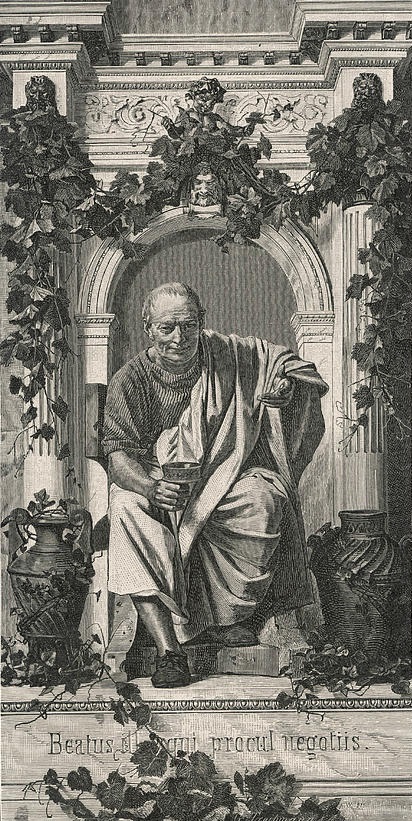 |
| Horace, as imagined by posterity. No authentic portrait survives. |
 |
| Chaucer, a 1602 print. He died in 1400, so who knows how accurate this is. A public figure and a member of Parliament, so perhaps this is a bit too drab. |
Who next? My choices
will be from Western European literature, since I’m not familiar enough with
the literature of Japan, China, India, or even Russia, though I’m sure they
offer candidates galore. So let’s stick
to the West and go more or less chronologically. The Greek authors don’t reveal themselves
personally, which makes for slim pickings. Homer has a great grasp of human nature, but did he even exist, or is he a comosite of a slew of authors? But one other name does stand out:
Aristophanes, the master of ancient comedy. Good translations of his plays (hard to find) have
left me howling with laughter, and his discourse on love, at the dinner party
to end all dinner parties in Plato’s Symposium,
amply confirms my decision. But my
dinner party will not aspire to the distinction of Plato’s, with its fascinating
and quite serious discussion of sexual love and attraction, since “nothing
spoils a good party like a genius.”
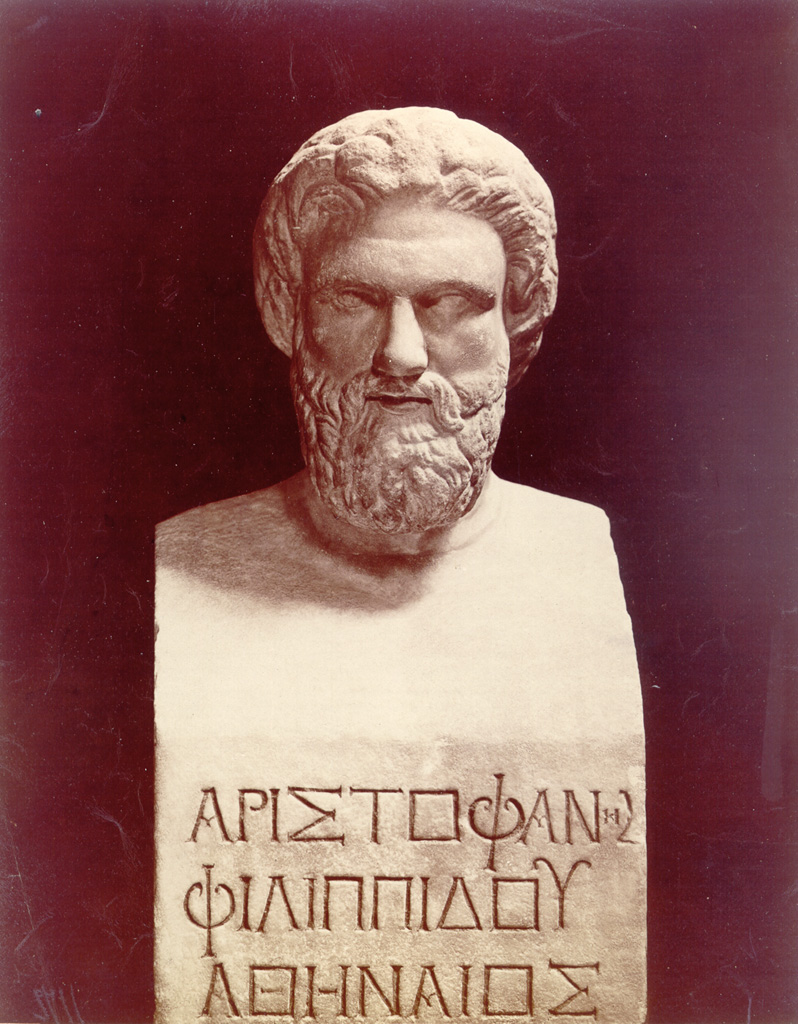 |
| Aristophanes. Ancient bust in the Uffizi Gallery in Florence. But we want him with a smile. |
So who among the Romans?
I’ve already nominated Horace.
Maybe Virgil, since in the Aeneid
his haunting phrase lacrimae rerum, “tears
for things,” suggests the sadness of mortality, something akin to Wordsworth’s
“still sad music of humanity.” But maybe
he’s too gentle, too melancholy, too reflective for my party; we can’t risk a
party-pooper, however gifted. As for the
other poets, Catullus and Propertius are possibilities, if yanked away from
brooding over their elusive ladyloves, Lesbia (aka Clodia) and Cynthia. But brooding, unrequited lovers are just as
much a risk as geniuses.
On to the Middle Ages. Dante, reeking of hellfire, is quite
impossible. Not many possibilities here, in this most serious and devout of
times, until we get toward Chaucer and the end of it. But again, this may just be my
ignorance. So on to the Renaissance and
its explosion of earthly joy and creativity.
In England, Shakespeare, since his plays show a wonderful grasp
of human character in all its variations, and sometimes a bawdy sense of humor
as well. Yes, gentle Shakespeare, we
cannot do without you. In Italy,
Benvenuto Cellini, on the basis of his uproarious Autobiography; but keeping in mind his violent streak, we’ll search
him for hidden knives at the door.
In France, that bawdy cleric Rabelais, with his urging to trinque, and his imagined Abbaye de Thélème and its injunction, Fais ce que voudras, “do whatever you like.” But he and Chaucer might huddle together in a corner and swap dirty stories amid whoops of laughter, so we’ll seat them apart at the table.
And that other giant of French Renaissance literature, Montaigne? Perhaps too serious, too studious, too judicious for our party. And the poets from all these countries? No, they’re much too self-centered, too gushily inspired, too lyrical; we can’t have them spouting poesy all over the place, while the rest of us are chatting civilly and dining.
 |
| Cellini. A 1901 bust in Florence. Posterity didn't forget this guy. JoJan |
In France, that bawdy cleric Rabelais, with his urging to trinque, and his imagined Abbaye de Thélème and its injunction, Fais ce que voudras, “do whatever you like.” But he and Chaucer might huddle together in a corner and swap dirty stories amid whoops of laughter, so we’ll seat them apart at the table.
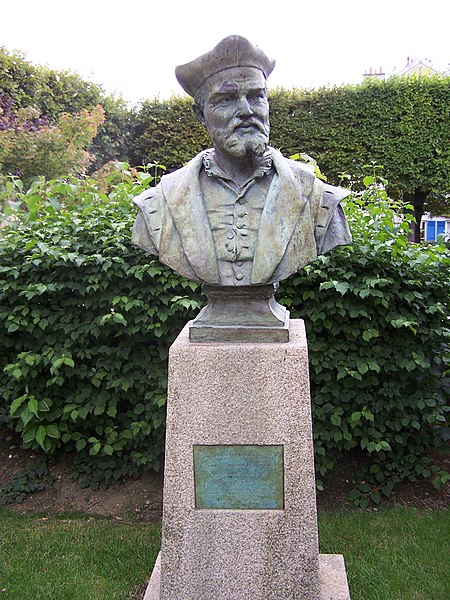 |
| Another bust: Rabelais. A nineteenth-century creation that makes him look like a scholar or a statesman. Sorry, but the best I can do. Henry Salomé |
And that other giant of French Renaissance literature, Montaigne? Perhaps too serious, too studious, too judicious for our party. And the poets from all these countries? No, they’re much too self-centered, too gushily inspired, too lyrical; we can’t have them spouting poesy all over the place, while the rest of us are chatting civilly and dining.
So now to the seventeenth century. Milton?
Horrors, no. Citing scripture, he
would lecture us on theology and try to justify the ways of God to man. We do want Molière, whose knowledge of human
nature matches Shakespeare’s. Just
imagine the two of them talking shop, but for that very reason, we’ll put them
at opposite ends of the table.
And to season the occasion with a feminine presence, we’ll invite Madame de Sévigné, whose letters, not too well known among les Anglo-Saxons, are frothy, light, and charming. And maybe La Fontaine, though his Fables are replete with a kind of proverbial wisdom that some of the diners might find annoying, even trite.
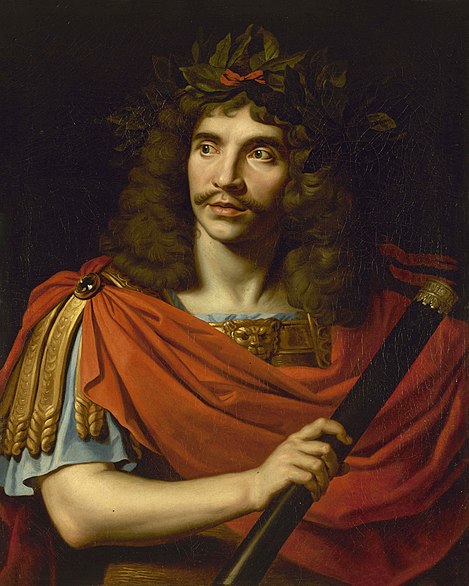 |
| Molière in the role of Julius Caesar, 1656. An oil portrait by Nicolas Mignard. A young Molière, not yet overcome with sickness. |
And to season the occasion with a feminine presence, we’ll invite Madame de Sévigné, whose letters, not too well known among les Anglo-Saxons, are frothy, light, and charming. And maybe La Fontaine, though his Fables are replete with a kind of proverbial wisdom that some of the diners might find annoying, even trite.
 |
| Madame de Sévigné. A portrait by Claude Lefèbvre, circa 1665. Yes, we definitely want her, if she'll come like this. |
And now to the eighteenth century. Certainly Voltaire, who knew how to present subversive ideas with a disarming charm.
In England we’ll stay shy of Swift, whose satire could be fierce and cutting. And Dr. Johnson? A set-in-his-ways, stodgy Tory. Best leave him to his coffee houses and cronies, since his unflinching conservatism risks sliding into bigotry. But ah, at last an American, and one who might confound and even enrage the good doctor. I mean, of course, Ben Franklin, who was a charming conversationalist, and much more than the aphoristic author of Poor Richard’s Almanack. With him on hand, wit will flash, provoking ripples of mirth.
 |
| Voltaire at his desk. An engraving by P. Baquoy, circa 1795, based on a painting by Monsiau. He knew a lot. Note that cunning smile. |
In England we’ll stay shy of Swift, whose satire could be fierce and cutting. And Dr. Johnson? A set-in-his-ways, stodgy Tory. Best leave him to his coffee houses and cronies, since his unflinching conservatism risks sliding into bigotry. But ah, at last an American, and one who might confound and even enrage the good doctor. I mean, of course, Ben Franklin, who was a charming conversationalist, and much more than the aphoristic author of Poor Richard’s Almanack. With him on hand, wit will flash, provoking ripples of mirth.
The nineteenth century offers a slew of candidates. Dickens certainly, for he mingled gladly with
all the people, titled ladies included, who volunteered to participate in his
amateur play productions.
Maybe Sir Walter Scott, since he is said to have hosted genially a multitude of guests, and not just literary ones, at his country estate. And maybe Byron as well, if on his good behavior and not roaming amorously too deep into the night. Oscar Wilde? Yes, for his wit alone.
And George Bernard Shaw? Likewise for his wit, though it can be acerbic.
Among the French I’ll take Balzac, who may fall in love with any older woman present (we’ll need to add some more).
And George Sand, so she can fall in love with the youngest man present (probably Catullus). She liked them young, sensitive, and vulnerable (think Musset, Chopin), so Catullus is definitely at risk. (My view of her is probably influenced by Merle Oberon as Sand in the 1945 film A Song to Remember, Hollywood's version of a life of Chopin, where she is ruthless in her final rejection of the dying Chopin (Cornel Wilde).
And from America, Walt Whitman, if he’ll drop his pose as “one of the roughs,” spruce up a bit, and just be a good, easy-going, democratic fellow.
 |
| Dickens at his desk. An 1858 photograph. He died at his desk, but not this one. |
Maybe Sir Walter Scott, since he is said to have hosted genially a multitude of guests, and not just literary ones, at his country estate. And maybe Byron as well, if on his good behavior and not roaming amorously too deep into the night. Oscar Wilde? Yes, for his wit alone.
 |
| Oscar, probably in New York, circa 1882. Surface is okay, if it shines. |
And George Bernard Shaw? Likewise for his wit, though it can be acerbic.
 |
| George Bernard Shaw, scribbling in a notebook, 1914. But we want him scintillating with wit at our table. Imagine him trading quips with Oscar. History would be made. |
Among the French I’ll take Balzac, who may fall in love with any older woman present (we’ll need to add some more).
 |
| Balzac, an 1842 daguerreotype. Looking a bit Napoleonic. We'll make him button up his shirt. |
And George Sand, so she can fall in love with the youngest man present (probably Catullus). She liked them young, sensitive, and vulnerable (think Musset, Chopin), so Catullus is definitely at risk. (My view of her is probably influenced by Merle Oberon as Sand in the 1945 film A Song to Remember, Hollywood's version of a life of Chopin, where she is ruthless in her final rejection of the dying Chopin (Cornel Wilde).
 |
| George Sand. An 1838 portrait by Auguste Charpentier. Not a raving beauty, but to be taken seriously, and at times a bit of a flirt. |
And from America, Walt Whitman, if he’ll drop his pose as “one of the roughs,” spruce up a bit, and just be a good, easy-going, democratic fellow.
More possibilities, as the nineteenth edges into the twentieth
century. Henry James, though he might
strike some as pompous, because he was urbane and well-mannered, and an astute
observer of society, its ironies and nuances.
And Proust, if we catch him before ailments and involuntary memory took him over; in the salons of his youth, he is said to have talked up a storm. And of course Colette, so charmingly irreverent, so knowing of the world and its ways.
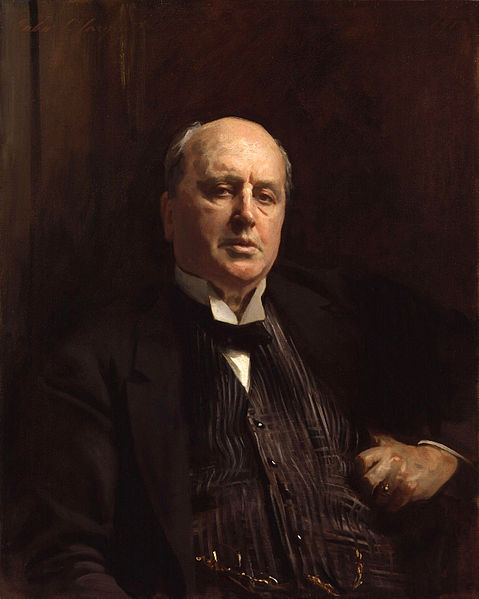 |
| Henry James, as done memorably by Sargent, 1913. |
And Proust, if we catch him before ailments and involuntary memory took him over; in the salons of his youth, he is said to have talked up a storm. And of course Colette, so charmingly irreverent, so knowing of the world and its ways.
 |
| A young Marcel in an 1895 photograph. |
For the full-fledged twentieth century, I’m a bit at a loss,
perhaps because I’m too close to these people and lack objectivity. Among the English bards, I would take Auden,
not my favorite poet, but a good mixer, so they say. And Christopher Isherwood, of course, but not
Sir Steven Spender, not just because that knighthood bothers me (like becoming
a member of the Academy in France), but because I met him once and found him
supersensitive, reticent, withdrawn.
Dylan Thomas? Lord no, a drunk. Alan Ginsberg? No, he’d probably do a striptease, and I don’t want to see his unlovely flesh. So how about the French? Sartre? Too intellectual, too too derisive, but maybe Camus. Cocteau? If we can drag him away from opium and his lover, and repeat Diaghilev’s inspired command to him: Emerveille-moi, “Do me wonders.” He did end up in the Academy, but at least he went in on the arm of his lover, Jean Marais, with author Jean Genet, ex-thief and self-proclaimed pervert, as his guest.
 |
| Isherwood (left) and Auden, 1938. |
Dylan Thomas? Lord no, a drunk. Alan Ginsberg? No, he’d probably do a striptease, and I don’t want to see his unlovely flesh. So how about the French? Sartre? Too intellectual, too too derisive, but maybe Camus. Cocteau? If we can drag him away from opium and his lover, and repeat Diaghilev’s inspired command to him: Emerveille-moi, “Do me wonders.” He did end up in the Academy, but at least he went in on the arm of his lover, Jean Marais, with author Jean Genet, ex-thief and self-proclaimed pervert, as his guest.
 |
| Jean Coctrau, 1923. |
And the Irish? James
Joyce would make me nervous, since he might do a wicked sketch of us and sneak
it into Ulysses. As for Samuel Beckett, his fierce
nihilism, his appetite for dark humor and decay, would put a damper on the
whole affair.
Belatedly, I realize I’ve forgotten the Scots. So let’s include Robert Burns, as long as he
speaks in Scottish dialect. How can we
omit the author of “Auld Lang Syne” and the poem to a timorous wee beastie?
 |
| Robert Burns, a 1787 portrait. Another target for George Sand. |
I've also slighted the Germans. How about the eminence of eminences, Goethe? I just don't know. He's so enshrined, so monumental. Thomas Mann? Ditto (though I love the Magic Mountain). And Walter von der Vogelweide? His name alone sings to me, there's music in it. But I have no knowledge of medieval German, so I strike out. Land of Beethoven and Bach, forgive. And correct me, if you can.
So there you have it: my list of guests, in hopes of assembling a joyous, life-affirming dinner party that would long be remembered. With hindsight I see a pattern in my choices:
So there you have it: my list of guests, in hopes of assembling a joyous, life-affirming dinner party that would long be remembered. With hindsight I see a pattern in my choices:
· Funny, not deep
· Juicy, not dry
· Open, not closed
· Loose, not tight
· Knowing, not naive
Had I been choosing applicants for a writers’ residence, or recipients of a prestigious literary award, I would probably have looked for just the opposite, minus “naïve.” But for a social event like a dinner party, genial masters of chitchat are required, and if the chitchat can be witty, perceptive, and memorable, so much the better.
So these are my
choices. Who have I left out? Who would you invite … or disinvite? I’d love to know. But beware of bleeding hearts, cynics, and anyone “sicklied o’er with the pale cast of thought.” And we do need more women.
| And here am I, gobbling a dessert at the Left Bank restaurant on Perry Street. Photo by my friend Barbara Hitchcock, visiting from Maine. |
Coming soon: Must Sons Hate Mothers? My partner Bob's blast at motherhood. And blast he did; you'll see.
BROWDERBOOKS
All books are available online as indicated, or from the author.
1. No Place for Normal: New York / Stories from the Most Exciting City in the World (Mill City Press, 2015). Winner of the Tenth Annual National Indie Excellence Award for Regional Non-Fiction; first place in the Travel category of the 2015-2016 Reader Views Literary Awards; and Honorable Mention in the Culture category of the Eric Hoffer Book Awards for 2016. All about anything and everything New York: alcoholics, abortionists, greenmarkets, Occupy Wall Street, the Gay Pride Parade, my mugging in Central Park, peyote visions, and an artist who made art of a blackened human toe.
If you love the city (or hate it), this may be the book for you. An award winner, it sold well at BookCon 2017 and 2018, and at the Brooklyn Book Festival 2018.
 |
Reviews
"If you want wonderful inside tales about New York, this is the book for you. Cliff Browder has a way with his writing that makes the city I lived in for 40 plus years come alive in a new and delightful way. A refreshing view on NYC that will not disappoint." Five-star Amazon customer review by Bill L.
"To read No Place for Normal: New York is to enter into Cliff Browder’s rich and engaging sixty years of adult life in New York. Yes, he delves back before his time – from the city’s origins to the 19th Century that Ms. Trollope and Mr. Dickens encounter to robber barons and slums that marked highs and lows of the earlier Twentieth Century. But Browder has lived such an engaged and curious life that he can’t help but cross paths with every layer and period of society. There is something Whitmanesque in his outlook." Five-star Amazon customer review by Michael P. Hartnett.
Available from Amazon and Barnes & Noble.
2. Bill Hope: His Story (Anaphora Literary Press, 2017), the second novel in the Metropolis series. New York City, 1870s: From his cell in the gloomy prison known as the Tombs, young Bill Hope spills out in a torrent of words the story of his career as a pickpocket and shoplifter; his brutal treatment at Sing Sing and escape from another prison in a coffin; his forays into brownstones and polite society; and his sojourn among the “loonies” in a madhouse, from which he emerges to face betrayal and death threats, and possible involvement in a murder. Driving him throughout is a fierce desire for better, a persistent and undying hope.
Reviews
"A real yarn of a story about a lovable pickpocket who gets into trouble and has a great adventure. A must read." Five-star Amazon customer review by nicole w brown.
"This was a fun book. The main character seemed like a cross between Huck Finn and a Charles Dickens character. I would recommend this." Four-star LibraryThing review by stephvin.
Available from Amazon and Barnes & Noble.
3. Dark Knowledge (Anaphora Literary Press, 2018), the third novel in the Metropolis series. Adult and young adult. A fast-moving historical novel about New York City and the slave trade, with the sights and sounds and smells of the waterfront.
 |
New York City, late 1860s. When young Chris Harmony learns that members of his family may have been involved in the illegal pre-Civil War slave trade, he is appalled. Determined to learn the truth, he begins an investigation that takes him into a dingy waterfront saloon, musty old maritime records that yield startling secrets, and elegant brownstone parlors that may have been furnished by the trade. Since those once involved dread exposure, he meets denials and evasions, then threats, and a key witness is murdered. What price must Chris pay to learn the painful truth and proclaim it?
Reviews
"A lively and entertaining tale. The writing styles, plot, pace and character development were excellent." Four-star LibraryThing early review by BridgitDavis.
"A lively and entertaining tale. The writing styles, plot, pace and character development were excellent." Four-star LibraryThing early review by BridgitDavis.
"At first the plot ... seemed a bit contrived, but I was soon swept up in the tale." Four-star LibraryThing early review by snash.
"I am glad that I have read this book as it goes into great detail and the presentation is amazing. The Author obviously knows his stuff." Four-star LibraryThing early review by Moiser20.
4. The Pleasuring of Men (Gival Press, 2011), the first novel in the Metropolis series, tells the story of a respectably raised young man who chooses to become a male prostitute in late 1860s New York and falls in love with his most difficult client.
What was the gay scene like in nineteenth-century New York? Gay romance, but women have read it and reviewed it. (The cover illustration doesn't hurt.)
What was the gay scene like in nineteenth-century New York? Gay romance, but women have read it and reviewed it. (The cover illustration doesn't hurt.)
 |
Reviews
"At times amusing, gritty, heartfelt and a little sexy -- this would make a great summer read." Four-star Amazon customer review by BobW.
"Really more of a fantasy of a 19th century gay life than any kind of historical representation of the same." Three-star Goodreads review by Rachel.
"The detail Browder brings to this glimpse into history is only equaled by his writing of credible and interesting characters. Highly recommended." Five-star Goodreads review by Nan Hawthorne.
Available from Amazon and Barnes & Noble.
5. Fascinating New Yorkers: Power Freaks, Mobsters, liberated Women, Creators, Queers and Crazies (Black Rose Writing, 2018). A collection of posts from this blog. Short biographical sketches of people, some remembered and some forgotten, who lived or died in New York. All kinds of wild stuff, plus some stuff that isn't quite wild but fascinating. New York is a mecca for hustlers of every kind, some likable and some horrible, but they are never boring.

Reviews
"Fascinating New Yorkers by Clifford Browder was like sitting down with a dear friend and catching up on the latest gossip and stories. Written with a flair to keep the reader turning the pages, I couldn't stop reading it and thinking about the subjects of each New Yorker. I love NYC and this book just added to the list of reasons why, a must read for those who love NYC and the people who have lived there." Five-star NetGalley review by Patty Ramirez, librarian.
"Unputdownable." Five-star review by Dipali Sen, retired librarian.
"I felt like I was gossiping with a friend when reading this, as the author wrote about New Yorkers who are unique in one way or another. I am hoping for another book featuring more New Yorkers, as I couldn't put this down and read it in one sitting!" Five-star NetGalley review by Cristie Underwood.
Readers will enjoy Clifford Browder’s lively, descriptive writing. Fans of non-fiction and more recent history will really appreciate the research that he put into these pages. His writing will definitely captivate your interest as it did mine. “Fascinating New Yorkers” is a pleasure to read and I look forward to reading more works by this author.
Readers will enjoy Clifford Browder’s lively, descriptive writing. Fans of non-fiction and more recent history will really appreciate the research that he put into these pages. His writing will definitely captivate your interest as it did mine. “Fascinating New Yorkers” is a pleasure to read and I look forward to reading more works by this author.
"Fascinating New Yorkers is a pleasure to read and I look forward to reading more works by this author." Five-star Reader Views review by Paige Lovitt.
Readers will enjoy Clifford Browder’s lively, descriptive writing. Fans of non-fiction and more recent history will really appreciate the research that he put into these pages. His writing will definitely captivate your interest as it did mine. “Fascinating New Yorkers” is a pleasure to read and I look forward to reading more works by this author.
Readers will enjoy Clifford Browder’s lively, descriptive writing. Fans of non-fiction and more recent history will really appreciate the research that he put into these pages. His writing will definitely captivate your interest as it did mine. “Fascinating New Yorkers” is a pleasure to read and I look forward to reading more works by this author.
"Fascinating New Yorkers is a pleasure to read and I look forward to reading more works by this author." Five-star Reader Views review by Paige Lovitt.
© 2019 Clifford Browder


